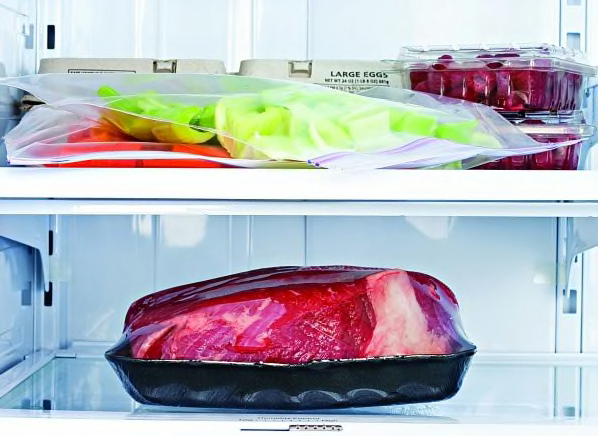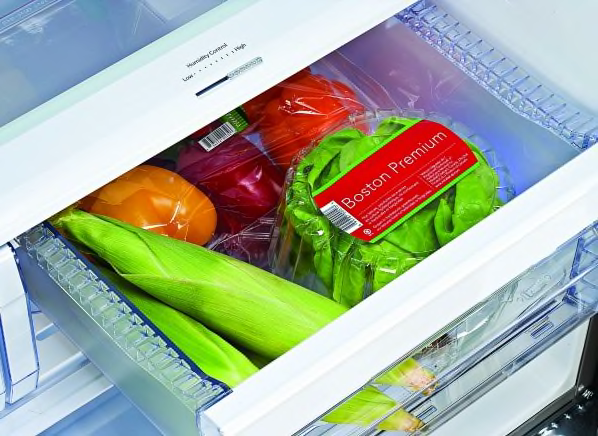Sign In

Menu
Suggested Searches
Recent Searches
Suggested Searches
Product Ratings
Resources
Chat With AskCR
Resources
All Products A-ZThe payment for your account couldn't be processed or you've canceled your account with us.
Re-activateMy account
Sign In
My account
Sign In


The holidays are all about excess—and that includes household waste, which increases by 25 percent between Thanksgiving and New Year's Day. Way too much of the refuse takes the form of edible food, whether it's uneaten portions of pumpkin pie or produce that's tossed before its time. The following tips will help your household produce less waste, which is good for the planet, and also keeps a few extra dollars in your pocket.
Know how long foods last. A lot of food takes longer to spoil than people realize. For example, did you know that fresh eggs are typically good for up to 5 weeks? And raw egg whites can be frozen for up to a year. Apples and oranges, meanwhile, should last for a few weeks in the refrigerator. See the chart below for more shelf life recommendations.
Optimize your refrigerator. For starters, make sure the temperature is a consistent 37° to 38° F in the refrigerator and the freezer a steady 0° F. If you're shopping for a new refrigerator, those that earn excellent temperature-performance scores in our refrigerator Ratings should deliver. We've also found that refrigerators with dual evaporators can extend the life of food by maintaining optimal humidity levels in the fresh-food section.

Location, location. As for storage, note that temperatures tend to be warmer on the door, so you don't want to store milk and eggs there, even if your refrigerator has gallon door storage and integrated egg shelves (use them for juice, condiments, and other non-dairy products). Milk and eggs both belong at the back of the unit, where it's coldest. And don't overload the refrigerator, since air circulation is needed for food to stay cold. In the freezer, spread items out on various shelves in single layers until they're frozen, at which point they can be stacked.
Handle leftovers wisely. Keep several airtight containers on hand to prolong the life of your leftovers. And start a compost bin, if you haven't already, for food scraps that can't be saved or used another way (stale bread, for example, can be turned into bread crumbs with the help of a food processor; check our food processor Ratings for top-performing models).
Be a smart shopper. Manufacturers are working to design refrigerators and pantries that use technology to know excatly how much food you have at home at all times. For now, it's up to you. Always cook or eat the food you have before buying more. And map out your meals before you shop so you only buy the things you need. Impulse purchases tend to result in greater waste.
Get to know your local food bank. In 2013, about 49 million Americans lived in food insecure households, according to the organization Feeding America. As long as it's nutritious, safe, and untouched, food can be donated to families and individuals in need. Here's how to find a food bank in your area.
| TYPE OF FOOD | REFRIGERATOR | FREEZER |
| DAIRY | ||
| Butter | 3 months | 1 year |
| Cheese, natural aged, block | 2-3 months | 6-8 months |
| Cheese, processed | 3-4 weeks | 6-8 months |
| Eggs, fresh in carton | 4-5 weeks | Not recommended |
| Eggs, raw whites | 2-4 days | 1 year |
| Mayonnaise | 2 months | Not recommended |
| Milk | 1 week | Not recommended |
| Yogurt | 1 month | Not recommended |
| MEAT & POULTRY | ||
| Chicken, whole | 1-2 days | 1 year |
| Chicken parts | 1-2 days | 9 months |
| Ground beef | 1-2 days | 3-4 months |
| Steaks | 3-5 days | 6-12 months |
| Hot dogs, unopened package | 2 weeks | 1-2 months |
| Hot dogs, opened package | 1 week | 1-2 months |
| Lunch meats, unopened package | 2 weeks | 1-2 months |
| Lunch meats, opened package | 3-5 days | 1-2 months |
| Bacon | 1 week | 1 month |
| FRUIT | ||
| Apples | 1-3 weeks | 8-12 months |
| Avocados | 3-5 days | Not recommended |
| Berries | 1-2 days | 8-12 months |
| Citrus fruit | 3 weeks | 4-6 months |
| Melon | 1 week | 8-12 months |
| VEGETABLES | ||
| Asparagus | 2-3 days | 8-12 months |
| Beets, carrots, broccoli | 3-5 days | 8-12 months |
| Mushrooms | 1-2 days | 8-12 months |
| Onions, green | 3-5 days | Not recommended |
| Salad greens | 1 week | Not recommended |
| LEFTOVERS | ||
| Casseroles | 1-2 days | 1 month |
| Cooked meat | 3-4 days | 2-3 months |
| Cooked fish | 3-4 days | 4-6 months |
| Cooked poultry | 3-4 days | 4-6 months |
| Pizza | 3-4 days | 1-2 months |
| Soups and stews | 3-4 days | 2-3 months |
—Daniel DiClerico (@dandiclerico on Twitter)
 Build & Buy Car Buying Service
Build & Buy Car Buying Service
Save thousands off MSRP with upfront dealer pricing information and a transparent car buying experience.
 Get Ratings on the go and compare
Get Ratings on the go and compare
while you shop